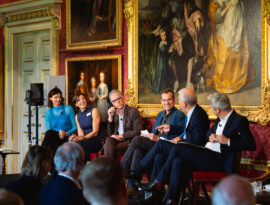Summit Synopsis
The Goodwood Health Summit 2025: The Soil Microbiome and the Human Microbiome
Goodwood Health Summit 2025: The Soil Microbiome and the Human Microbiome
The third annual Goodwood Health Summit, presented by Randox Health, will take place on Thursday, 2 October 2025, at Goodwood House
This year’s summit delves into the profound and intricate relationship between the soil microbiome and the human microbiome, exploring how these interconnected ecosystems are fundamental to our overall
The third annual Goodwood Health Summit presented by Randox took ‘The Soil Microbiome and the Human Microbiome’ as its theme. Introducing the event, The Duchess of Richmond, a long-standing health campaigner said that ‘soil quality determines the food we produce, the nutrients we consume, and the microbial diversity that supports immunity and resilience from the earliest stages of life. When soils are depleted, the health consequences reverberate across the animal and human populations.’
Summit co-founder Stephanie Moore, the clinical nutritional therapist, author, and lead for the Goodwood Gut Health Programme said that this year’s event would ‘dig into two huge subjects with a shared importance. The gut microbiome and the soil microbiome are where human health and the health of the planet begin.”
Held at Goodwood House and streamed live, this year’s Summit was moderated by Professor Chris van Tulleken, the BAFTA-winning broadcaster, author, doctor and Associate Professor at UCL, who said that the ‘genius’ of the Summit lay in ‘bringing together two communities of academics, scientists, experts and practitioners who have been isolated from each other for a long time,’ despite the ‘intricate relationships’ between their fields.
The first session was titled ‘The State of Our Environment – Bridging Regenerative Agriculture and Human Health’. Mr James Kinross, the surgeon, author and world-leading authority on the microbiome was joined on stage by Dan Kittredge, founder of the Bionutrient Food Association & The Bionutrient Institute, and a lifelong farmer, educator, and advocate for nutrient-dense food.
As a surgeon, Dr Kinross said the majority of the disease that he operates on is preventable, and that ‘how you set up the gut and how you set up health more broadly in very early life is a critical determinant of the longer-term risk of these diseases’. We are experiencing an ‘internal climate crisis’, he said, and there is a direct link between the health and variety of the human and soil microbiomes. Not only does better soil grow better food, but there is a more direct link too. “Gardeners’ microbiomes shift with the seasons,” he said, “because they’re putting their hands in the soil. I prescribe my patients to get out into the garden and to reconnect with nature.”
Dan Kittredge struck an optimistic note: he acknowledged the ‘vast amounts of desertification that have occurred through the practice of agriculture over the last 10,000 years,’ but said that we could ‘regreen this planet’, turning dirt back into healthy soil. ‘If you’re focusing on the plant, you’re missing the point,” he said. “The real point is to optimise the function of the soil microbiome.” He advocated consumer action rather than regulatory reform as the most effective means of change. “We have evolved with sophisticated nutrient monitoring systems called noses and tongues,” he said. “When you eat a carrot and it doesn’t taste particularly good, it’s not particularly good for you.” Consumers should crowd-source knowledge on this, he said, and leave poorly-grown, nutrient-weak foods on the shelves. “We don’t need to learn about this stuff,” he said. “We already know it.”
The second session was titled ‘Policy, Food Culture, and Personal Health: Reimagining Food Systems for the 21st Century’, and brought together Dr Federica Amati, Nutrition Lead at Imperial College London Faculty of Medicine, and Patrick Holden CBE, the organic farmer and founder of the Sustainable Food Trust.
Dr Amati said that there was ‘a parallel extinction event happening in our guts which reflects what’s happening in our natural environment’. We have lost around half of the microbial diversity in our gut, she said, and the impact was particularly severe in infants given the profound influence of the first thousand days on later health. We need to think of our gut microbes as ‘mini-pharmacies’ with a systemic impact, she said. While much remains to be understood about the gut microbiome, ‘the science is moving very quickly’, and the advice on how to improve it is ‘actually fairly simple’. Food contributes up to 65 per cent of the composition of the gut microbiome, she said, with other environmental influences, including soil directly, contributing the rest. Studies show that improvements in soil health have observable human health outcomes, including a decline in stunting in children.
Patrick Holden compared the ‘mystery’ of soil to that of the human microbiome: ‘we’re only at the beginning of our understanding of it,’ he said. “As a practitioner, an insight which struck me very deeply 15 years ago is that the soil can be likened to the stomach of the plant,” he said, with plants as dependant on their ‘stomach’ for their health as humans are on ours. He challenged the ‘no plough’ and ‘no cow’ schools of thought on agriculture, saying that both could make a contribution to the health of our soils and atmosphere. And he described the Goodwood Health Summit as ‘a really important, even historic gathering’ for ‘building this bridge’ between the medical and farming communities.
The Summit’s final session saw the panellists reassemble to take questions from the floor and from those following on the live stream. They were joined on stage by Lauren Aitken, Head of Operations for Randox Health, who opened by outlining some recent Randox research on the impact of farming and other environmental factors on human health. In one study, lower water quality, due to the fertiliser and pesticide run-off from conventionally farmed fields, brought a ‘dramatic reduction’ in FSH and LH hormones in women, which are ‘strongly linked’ to fertility.
From the floor, Goodwood’s local Liberal Democrat MP Jess Brown-Fuller said that ‘there is political will across the House to do something about this,’ but that Government cannot see that better funding for DEFRA might also save money for the NHS. “I think that’s a fundamentally broken part of our system,” she said. Also speaking from the floor, the epidemiologist and public health campaigner Dr Dolly van Tulleken said legislators understand that the public want change, but that they do not feel the ‘political heat’ at all, and it needs to be turned up. Both advocated writing to your MP, to make our voices heard.
Mr James Kinross said that standards and definitions would help drive policy change: work is starting on this but we still don’t have fundamental agreements around what a healthy human or soil microbiome is. Dan Kittredge said a different, bottom-up approach was needed. “If we organise ourselves around our collective common interest, that will build the momentum that will then turn into government action,” he said. “If the people lead, the leaders will follow.”
Lauren Aitken said Randox’s ‘huge engagement’ with people aged between 25 and 45 showed that ‘people are ready for this change’. And Stephanie Moore advocated starting even earlier, educating children on the importance of their microbiome and encouraging them to feed it every day with the right stuff, treating their gut bugs ‘like they would their pet rabbit’.





